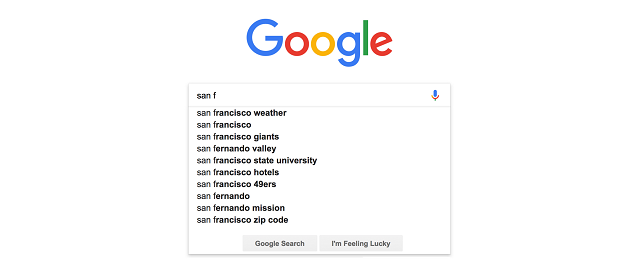The Workings behind Google Auto complete
We all know what autocomplete is and how it works (basically) but what we don’t really know is how much time it saves for us. A post by Google shows that Google autocomplete saves around 25% of our typing time or in other words around 200 YEARS of typing time per day, Yes you read right 200 YEARS per DAY! On the other hand google autocomplete is especially useful for mobile devices as you don’t have to take too long on typing on a smaller screen. Though, most of us have become master typists at this point.Google Autocomplete is a feature that you will find anywhere, that is wherever there is a Google search bar like obviously Google Home, Google app present in Android and iOS, Quick search box in Android and Omnibox address bar within Chrome. Type and there you have the predictions appear.
Google uses the term predictions in Google Autocomplete:
In a Google article recently posted, Google has specifically used the word predictions to describe Google autocomplete rather than suggestions and for good reason too. Google autocomplete tries to predict what you want to search for, rather than showing you what different things you can search for.Determining of Predictions on Google Autocomplete:
Google looks at real searches done by other users, trending information and your location and passed searches to create predictions in Google’s Autocomplete. It fills in predictions according to words already typed and eliminates search predictions that do not match words as and when more info is typed by us.
Predictions against Google Autocomplete rules:
When it comes to giving predictions, Google does not want to shock users in getting out- of- context and insensitive searches so they have put up a set of rules to govern the same within Google autocomplete.Some of the predictions that are against the rules are hateful comments against groups or individuals on the basis of race, religion etc., predictions that are violent and dangerous and harmful predictions.
Google also removes predictions from Google autocomplete that are based on valid legal requests, those that are related to spam and those that relate to piracy.
Control mechanisms in place in Google Autocomplete:
Google does its best when it comes to controlling inappropriate predictions but with sifting through billions of searches per day sometimes inappropriate predictions on Google autocomplete slip through the cracks and that is why sometimes we see things that at times can be shocking.
Google has also started a feedback tool since last year that has been useful to them in removing unwanted predictions from Google autocomplete. They also plan on increasing the criteria for determining what is considered hateful in removing unwanted suggestions from Google autocomplete.
Reporting of Unwanted predictions:
Individuals too now can report anything that appears inappropriate on Google autocomplete. For those using a desktop there is “report inappropriate predictions” link that appears on the bottom of a search box and for those on Android, users can long press on the prediction to report it.





No comments:
Post a Comment